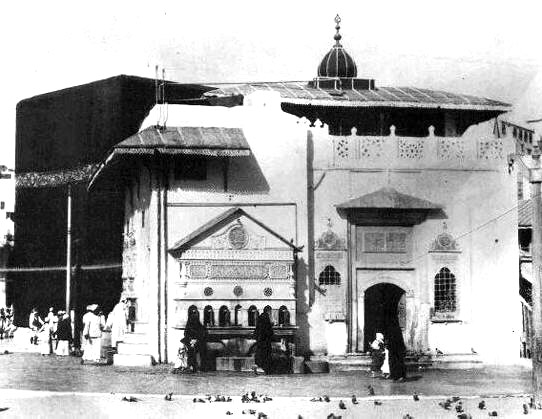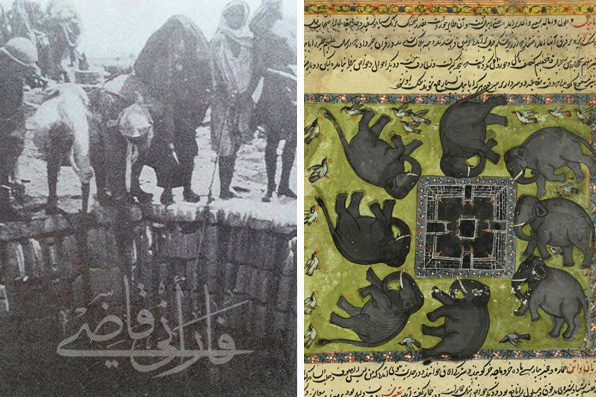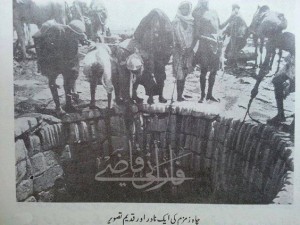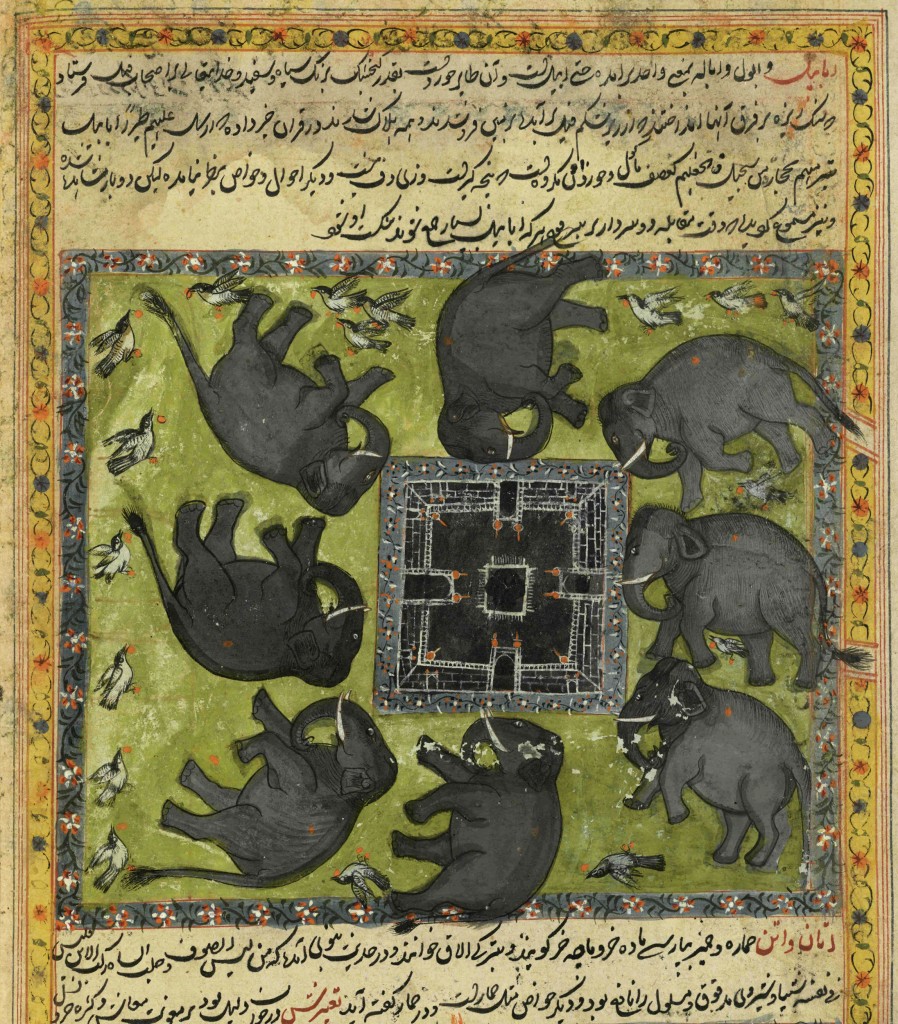Abdul Muttalib RA URS – Grandfather of Holy Prophet (SWS) – Jumada al-Awwal
Abdul Muttalib RA URS – Jumada al-Awwal
Abdul Muttalib RA URS – the Grandfather of Holy Prophet (SWS), is in the month of Jumada al-Awwal, although the exact date is not openly known.
Abdul Muttalib (RA) not only was the grandfather and guardian of the Holy Prophet (SWS), whilst he was alive, but he also opposed Abraha, from Yemen, and his army of elephants who attempted to attack the Holy Kaaba in Mecca in 570 AD but was defeated by Allah Almighty’s army of birds (Ababeel, Holy Quran, Surah al-Fil) and he was given holy dreams to rediscover the Zamzam well left covered by the Jurhum tribe.
His father was Hāshim ibn `Abd Manāf, the chief of the distinguished Hāshim clan, a subgroup of the Quraysh tribe of Mecca. They descend from Sayydina Ismail (AS) and Ibrahim (AS). His mother was Salmah bint Amr from the Banu Najjar, a clan of the Khazraj tribe in Yathrib (later called Medinah). Hashim died while doing business in Gaza, before ‘Abdul-Muṭṭalib was born.
He was given the name “Shaybah” meaning ‘the ancient one’ or ‘white-haired’ because of the streak of white through his jet-black hair, and is sometimes also calledShaybat al-Ḥamd (“The white streak of praise”). After his father’s death he was raised in Yathrib with his mother and her family until about the age of eight, when his uncle Muṭṭalib went to see him and asked his mother Salmah to entrust Shaybah to his care. Salmah was unwilling to let her son go and Shaybah refused to leave his mother without her consent. Muṭṭalib then pointed out that the possibilities Yathrib had to offer were incomparable to Mecca. Salmah was impressed with his arguments, so she agreed to let him go. Upon first arriving in Mecca, the people assumed the unknown child was Muttalib’s slave, giving him the name ‘Abdul-Muṭṭalib (slave of Muṭṭalib).
History Before the Prophet (Peace & blessings be Upon them)
There were a few significant people that came before the Holy Prophet (SWS), which are worth mentioning. Qusay was one of the main chiefs of Makkah, who was from the tribe of Quraish. He was a handsome fellow and the leadership of Makkah fell to him after a bitter war. War was common amongst the Arabs. The Quraish were considered amongst the noblest tribes because they were direct descendents of Ismael.
Qusay ruled Makkah like a king. He would collect the taxes from the people, to provide for the pilgrims who still visited Makkah and performed the Hajj. Qusay built himself a big spacious house close to the sanctuary. He also encouraged his tribesmen to build themselves houses. Previously the people had lived in tents, camping close to the Kaabah.
Qusay had many sons, the most prominent and famous was Hashim. He was very gifted and provided water and food for the pilgrims, when they came to Makkah. He was a great merchant and established the two great trade routes through Makkah. Both the trade routes passed through Yathrib, which was a small oasis town which lay on the ancient incense route. The winter trade route was between Makkah and Yemen whilst the summer trade route went into northern Arabia going into Palestine and Syria.
Through this trade, Makkah began to prosper and became a major city which attracted much wealth. Hashim married Salma, the daughter of Amr, from the clan of Khazraj. Salma and Hashim had one son whom they named Shaybah. Both Salma and Shaybah remained in Yathrib and were often visited by Hashim on his trade journeys. However, Hashim wasn’t granted a long life and he passed away in the Gaza in Palestine. Shaybah remained with Salma in Yathrib, until Shaybah was about 14 years of age.
Abdul Muttalib (RA), the brother of Hashim took over the role of looking after the affairs of the pilgrims. However, he had great love for his brother, Hashim, who had passed away at such a young age. He also heard a lot of good things said about Hashim’s son, Shaybah. Shaybah had continued to live in Yathrib with his mother Salma after his father had passed away. He was growing into a pleasant youngster with a kind nature.
Abdul Mutallib (RA) decided to visit Salma and Shaybah in Yathrib. On reaching Yathrib he spoke to his nephew and Salma. He explained to them that since Shaybah was a son of Hashim, he should come and live in Makkah. Makkah was a great city and had a lot more to offer than Yathrib. This was especially true because Shaybah was from the tribe of Quraish, the most respected and honoured tribe in Arabia. He also had the possibility of taking over the sacred and noble duties at Hajj, which his father fulfilled so well.
Salma, reluctantly at first, decided to let Shaybah travel to and live in Makkah with his uncle Muttalib. Both Uncle and nephew set off for Makkah, leaving behind Yathrib. When they reached Makkah, the people were amused at the sight of seeing Muttalib and this young boy, whom they assumed to be the slave of Muttalib. They referred to him as Abdul Muttalib (RA), which means the slave of Muttalib. After Muttalib corrected them and told them that he was his nephew, they lovingly continued to call Shaybah by the name of Abdul Muttalib (RA).
After Abdul Muttalib (RA) came to Mecca, he came to be loved by the people, He managed to secure his rights from his family and lived happily in Mecca. After Muttalib passed away, Abdul Muttalib (RA) took over in the duties of proving food and water for the pilgrims. He excelled in this, which further enhanced his reputation for leadership and fairness.
One of the first events which took place at the time of Abdul Muttalib (RA) was the rediscovery of the blessing of Zamzam. The Zamzam had been taken away from the people when they had strayed from tawheed. The Zamzam was a great blessing of Allah which had been gifted to the people many hundreds of years earlier by Prophet Ismail (AS) and lady Hajar (AS). The people had gradually moved away from the truth and became more wicked and unjust. They began to worship idols, which is such a grave sin. Allah took the Zamzam away from the people and this blessing had been lost for many years.
The story begins when Abdul Muttalib (RA) was sleeping under the shade of the Kaaba, at a place near the Hijr Ismael. This was a common occurrence for people to see Abdul Mutallib (RA) sleeping there. On one occasion, he had a dream which repeated itself three times and in the last dream, he heard a voice asking him to dig in a certain place near the Kaaba.
Abdul Muttalib (RA) was initially stunned by the dreams but then decided he would listen to this voice in the dream. Abdul Muttalib (RA), in the company of his son Hashim, took two pick axes and began to dig near the Kaaba. It was at the place where animals were sacrificed, between the two idols. Before long a crowd gathered to see what was happening. He was asked to stop by some of the people but he continued to dig with his son Hashim watching over him.

This photo shows how a building was constructed over the place where the Zamzam Well is located. It was built during the era of Sultan AbdulHamid II in 1300 AH, engineered by As-Said Muhammad Sadiq.
Before long he came to some well stones where he found some treasures the tribe of Juram had buried. This included swords, armours and the two gold statues. He also found the well of Zamzam that had been lost and forgotten about for so many years. When he unearthed it, the water gushed forth and others tried to join Abdul Muttalib (RA) in this blessed work. However, he lay claim to the finding and the tradition of providing Zamzam fell exclusively to him.
After this Abdul Muttalib (RA) gained lots of respect from the Arabs. He did a prayer that may Allah provide him with ten sons and promised that if they all grew up into young men he would sacrifice one of them. Little did he know that Allah would soon bless him with ten sons and he would need to fulfill this promise.
Over time he had ten sons and with regret he remembered his promise to sacrifice one of them. For such a long time he dreaded this day but he knew in his heart that he would need to. Abdul Mutallib (RA) decided to fulfil his promise but which son would he choose? Abdul Muttalib (RA) drew lots and the fate of the sacrifice fell on Abdullah (RA), the youngest and his most beloved son. He was very sad but he knew that he must fulfill this promise.
Abdul Muttalib (RA) went to the Kaaba with his son Abdullah intending to sacrifice him. When the people saw this they stopped him asking him where he was going with this handsome young boy and the knife. The people learned that he was going to sacrifice him so they told him to sacrifice some camels instead.
After listening to their advice he decided to consult a wise woman from Yathrib. Adbul Mutallib (RA) told the whole story to the wise woman and she advised him to sacrifice ten camels at a time until the promise was fulfilled. He would know that the promise was fulfilled when the divining arrow would point at the camels instead of his son. The divining arrows was a way of deciding a matter in the days of ignorance.
He would sacrifice ten camels and the arrow would point towards his son. He would sacrifice another ten camels and would check with the arrow each time. He sacrificed a total of a hundred camels (ten at a time) until he knew that this was acceptable to fulfill his promise.
Abdul Muttalib (RA) arranged for his son, Abdullah (RA), to marry a lady by the name of Amina (RA) from a tribe in Yathrib,daughter of Wahab bin ‘Abd Munaf, the chief of Bani Zuhrah. She was a noble and respected lady from a good family. Abdullah was only a young man of twenty-five, was very handsome and a noor filled his face when he was going to get married. They were a well-matched couple and everyone celebrated with great happiness and joy.
Amina (RA) and Abdullah (RA) started their life together and after a few months he was asked to go on a trade journey to Syria. Amina (RA) was upset because they had only been married for a few months and now Abdullah (RA) was going to leave. Deep down she knew that they would be together soon when he returned from the journey. Little was she to know that he would not return to her alive.
Year of the Elephant
After a few months of marriage, Abdul Muttalib (RA) sent Abdullah (RA) on a trade journey to Syria. On his return journey from Syria, Abdullah (RA) became very ill and passed away. He was buried near Yathrib. This was a particularly sad occasion for Abdul Mutallib (RA) because he loved Abdullah (RA) very much and Allah had taken his life at such a young age of twenty five. Amina was also extremely sad at the death of her husband with whom she had spent such little time. Amina thought about Abdullah’s (RA) child, who wasn’t born yet and had already been orphaned.
However, to add to this burden, another storm was brewing in the form of an army of sixty thousand soldiers with Abraha as their chief. They were coming from Yemen with the intent of destroying the Kaaba. The Arabs had never seen such a big army before and knew deep down that they would never be able to fight such a force. This army was fully equipped and trained for war. It was commanded by the Yemeni King, Abraha and was led by a number of powerful elephants.
The army was gradually moving towards Makkah and was only a matter of time before it had arrived. The people of Makkah, had no intention of defending the Kaaba and fighting this huge army. They had already decided in their hearts that they would retreat to the mountains until the army had left.
The Surah al-Fil talks about this incident. The Surah is translated below and followed by some commentary on the Surah.
Al-Feel (the Elephant)
Have you not seen how your Lord dealt with the people of the Elephant?
Did he not render their treacherous plan futile?
He let loose against them flights of birds
Which pelted them with stone of Baked clay
Thus he made them like chewed dry Grass.
This is Surah number 105 in the Holy Qu’ran. The Qu’ran has a total of 114 surahs which are of different lengths. Allah revealed the Qu’ran over a period of 23 years. The surahs have been put under two headings – the Makki Surahs and the Madni Surahs. The Makki Surah were revealed before the Hijra (the migration from Makkah to Madina by the holy Prophet (SWS)). The Madni Surah were revealed after the Hijra. All the scholars agree that Surah al-feel is a Makki Surah.
This Surah is addressing the Arabs at the time of the Prophet (SWS) and remind them of the great favours Allah has done for them. It reminds them of an incident which they had witnessed with their own eyes. It talks about the mighty army of Abraha which was too powerful for all Arabia to fight. Allah has destroyed the entire army swiftly before it attacked the Kaaba.
The Kaaba had become a place of pilgrimage drawing people from all over the Arabian Peninsula. It became very busy and a lot of trade and business took place there. Some other countries saw this success and tried to create their own building, which could be used to attract people and let them make pilgrimage. Allah, however, did not grant any of them success.
Abraha, the king of Yemen, was an Abyssinian Christian who built a magnificent cathedral in the capital of Yemen, Sanah. After building this Cathedral and decorating it with gold, he wrote to the Negus saying he would not rest until he had diverted the Arab’s pilgrimage to it. He publicly announced this in Yemen so that everyone new about this.
He was trying to provoke the Arabs into some form of retaliation, giving him an excuse to attack Makkah and destroy the Kaaba. An enraged Arab defiles the Cathedral and a group of Quraysh set fire to it. This was all the excuse Abraha was looking for, so in 571 AD he took his army and set march towards Makkah. His army included sixty thousand troops and thirteen elephants.
Yemen was a super power in its time. No way could anyone fight against such a vast and powerful army – most had never seen such a big army in their lives! On the way, Abraha had some minor retaliation from the tribes but gradually headed towards Makkah. He also got some guides on the way to give him the best and safest route.
Near the outskirts of Makkah, Abraha captured two hundred camels that belonged to Abdul-Muttalib (RA). He then sent an envoy of his to Makkah to tell them that he had no intention to fight the Arabs but to destroy the Kaabah. If they offered no resistance then there would be no cause for bloodshed. He also instructed them that if they wanted to negotiate with him then they should return with their chief. The chief of Makkah at that time was Abdul-Muttalib (RA).
Abdul Muttalib (RA) was taken to Abraha, who asked him what he wanted. Abdul Muttalib (RA) replied that he wanted the camels that Abraha had taken to be returned to him. Abraha returns the camels and said that you only demand your camels but you say nothing about this house which is your sanctuary and the sanctuary of your forefathers.
Abdul Muttalib (RA) replied that I am the owner of the camels and as for the house, it has its own owner and he will defend it. With this Abdul Muttalib (RA) left and went back to Makkah.
Abdul Muttalib (RA) told the people to take their families and go to the mountains on the outskirts of Makkah. Abdul Muttalib (RA) went to the Kaaba and prayed to Allah to protect his house. He did not pray to any of the idols that were in the Kaaba but to Allah himself. After this Abdul-Muttalib (RA) and his companions left and headed for the mountains to join the rest of the Makkans.
The next morning Abraha prepared to enter Makkah with his special elephant, Mahmood, leading the army. Mahmood stopped and knelt down refusing to move. It was coaxed and then beaten with iron bats trying to get it to move forward. When it was made to face any other direction, it would immediately start off but when they made it face Makkah it would again stop.
Suddenly swarms of birds appeared with baked clay stones in their beaks and claws and showered the army with them. Whoever the stones hit would hit, the hot stones pierced and burnt through not only the metal armour but both skin and bone,and these hot stones were thrown by the birds (Ababeel) until they disintegrated and destroyed the whole army.
In the confusion they tried to retreat to Yemen but the whole army was destroyed. This incident became famous and the story reached all corners of Arabia. After this the Makkans started to worship Allah for a few years then they returned to worshiping idols.
This year became known as the year of the elephant. It was in this year, 571 AD, that an even greater event took place which would change the course of world history. A special child was born in Makkah to the lady Amina (RA) and her husband Abdullah (RA), who had recently passed away. The birth of this child was celebrated in the heavens above and foretold in books of history and religion throughout the world. He would bring justice and the knowledge of the Almighty Creator to the Earth. He would enlighten the world, removing the shackles of ignorance and subservience. This child was born to an ignorant and decedent society which would be transformed into the most knowledgeable and just society.
This child would grow and become a role model for many billions of humans from all parts of the world. His words and actions would be spoken about and studied for thousands of years afterwards. This child would grow to become the Holy Prophet Muhammad (SWS) and Last Messenger of Allah Almighty (God).
Bir hurmati Habib bir hurmati anzalta alayhi Surat al-Fatiha.





